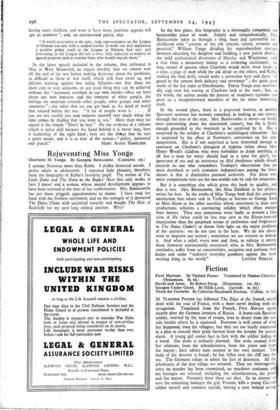Rejuvenating Miss Yonge
Charlotte M. Yonge. By Georgina Battiscombe. (Constable. i5s.) I ADMIRE Newman more than Keble. I dislike historical novels. I prefer adults to adolescents. I expected little pleasure, therefore, from the biography of Keble's favourite pupil. The author of The Little Duke and The Dove in the Eagles' Nest. (the only works of hers I knew) and a woman whose mental development appears to have been arrested at the time of her confirmation. Mrs. Battiscombe has put these priggish apprehensions to shame. I have read her book with the liveliest enjoyment, and on the strength of it devoured The Daisy Chain with uncritical voracity and bought The Heir of Reddy& for my next long railway journey. Why? In the first place, this biography is a thoroughly competent and businesslike piece of work. Simply and sympathetically, Mrs. Battiscombe takes us through a long, busy and uneventful life: childhood with " parents of the old reticent school, reverent and practical," William Yonge dividing his superabundant energies between educating his daughter and building a new parish church ; the mild ecclesiastical diversions of Hursley and Winchester, with a visit from a missionary bishop as a crowning excitement ; the long record of success- when Charlotte would write three books at a time, a page of each while the ink dried on the others, and Keble, reading the final draft, would make a correction here and there " to guard to the utmost both delicacy and reverence " ; the quiet good works of the last years at Otterbourne. Fanny Yonge may occasion- ally sigh over her sewing or Charlotte look at the starsbut, on the whole, the author avoids the horrors of imaginary episodes and gives us a straightforward narrative of the far more interesting truth.
In the second place, there is a perpetual interest, as another Spectator reviewer has recently remarked, in looking at one century through the eyes of the next. Mrs. Battiscombe is never—or hardly ever—patronising about the nineteenth century, but she is firmly enough grounded in the twentieth to be surprised by it. She is surprised by the solidity of Charlotte's multilingual education. She is surprised by the effect of Newman's conversion on .his con- temporaries. She is if not surprised at least interested enough to comment on Charlotte's disregard of hygiene (what about Mrs. Henry Wood's children who were forbidden to drink anything at all lest a taste for water should lead to a taste for gin?), her ignorance of sex and an insistence on filial obedience which should astonish no one who remembers Trollope's observation that the main drawback to early economic independence among the lower classes is that it diminishes parental authority. For those who enjoy comparisons here are the two worlds side by side for inspection.
But it is something die which gives this book its quality, and that is zest. Mrs. Battiscombe, like Miss Delafieki in her preface, writes for love. In the works of Miss Yonge both find the complete satisfaction that others seek in Trollope or Surtees or George Sand or Miss Alcott or the other novelists whose enjoyment in their own productions achieves a convincing solidity whith often escapes their betters. They may •sometimes write badly or present a false view of life (what could be less true save to the fifteen-year-old imagination than the perpetual scenes of confession and forgiveness in The Daisy Chain?) or throw little light on the major problems of the universe : we do not care in the least. We do not always want to improve our society ; sometimes we are content to enlarge it. And what a _relief, every now and then, to enlarge it among those (however sentimentally conceived) who, as Mrs. Battiscombe concludes, suffer from no uncertainties, recognise and perform their duties and make "ordinary everyday goodness appear the most


























 Previous page
Previous page